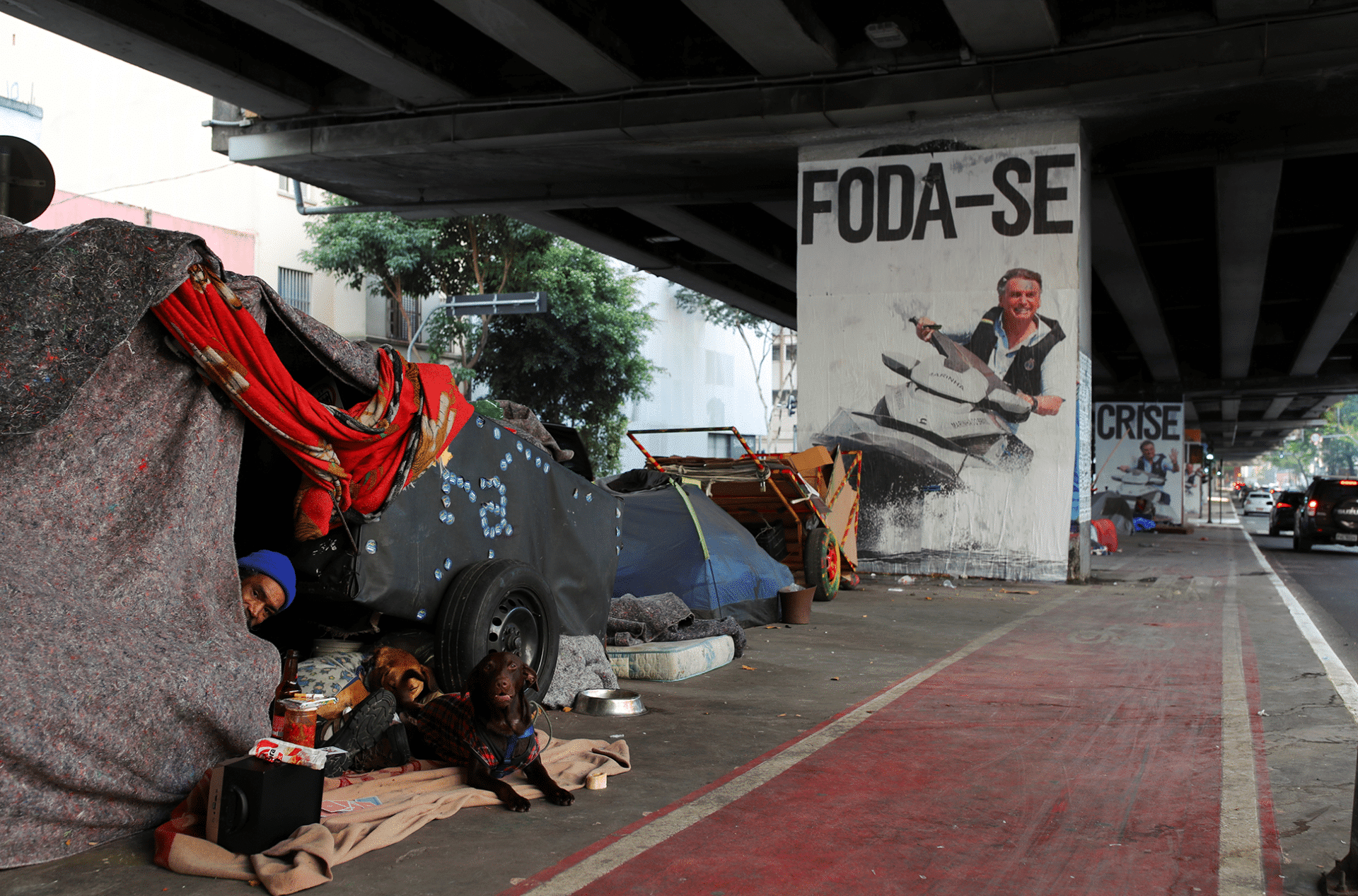
A poster depicting Jair Bolsonaro driving a jet ski below the words "fuck you" near a homeless encampment in São Paulo, Brazil. Photo: Amanda Perobelli/Reuters.

Orinoco Tribune – News and opinion pieces about Venezuela and beyond
From Venezuela and made by Venezuelan Chavistas

A poster depicting Jair Bolsonaro driving a jet ski below the words "fuck you" near a homeless encampment in São Paulo, Brazil. Photo: Amanda Perobelli/Reuters.
By Emir Sader – Jun 5, 2023
There are two types of desaparecidos (disappeared people): the physically disappeared and the legally disappeared. A young and already highly qualified Brazilian researcher focuses on a particular subgroup: the undocumented, those who seek to survive without personal identity documents — a group of people who are not seen as citizens.
When imprisoned by a system that does not grant them proper identity documents, they are registered by punitive bodies that do not even allow them to use their name. When released after being arrested, this group of tens of thousands of people in Brazil do not even possess identity documents. They are detained as undocumented and released as undocumented, as if it were their destiny in life. There is citizen invisibility and citizen visibility.
“And if I don’t exist, why do they charge me,” is the title of Letícia Chahaira’s book, edited by the Public Policy Laboratory of the State University of Rio de Janeiro (UERJ). The title of her book is taken from the lyrics of a song by one of the greatest contemporary Brazilian musicians, the rapper Criolo.
Lula Brings Together South America in Brasilia: ‘We Must Unite’
Chahaira realized that the number of people without birth registration in Brazil was nearly three million. These people are unable to access services such as hospitals, schools and many others that, according to the Constitution, are considered universal rights.
Initial marginalization occurs when people are required to have an identity document to access their rights. On the other hand, the State does not require this documentation when the person enters the prison system.
A third of the prison population in Rio de Janeiro does not have civil identification. Nationwide, eight out of ten people [in prison] do not have identity documents. “Invisible as a citizen, this person can spend an entire life in which they do not exist in terms of legal-procedural ties to the State. For that reason, they are deprived access to the most fundamental rights, feeling restricted and denied of human rights that should overcome any type of condition,” reads the book.
In Brazil, identity documents are required for almost all activities. In the current legislation, social rights are universal, but the undocumented subject is deprived of the enjoyment of fundamental human rights.
Western ‘Humanism’: One-Third of Canadians Support Euthanasia for the Homeless
Chahaira confirms the serious violation of human rights committed by the State by demanding the presentation of documents for the most essential activities while not providing a significant portion of the people with those documents. Thus, the State fails to fulfill its duty to recognize the subject of rights that should be guaranteed to all.
However, the punitive arm of the State does not hesitate to subject them to the repressive State, even when the individual is detained without the necessary documentation to verify their true identity.
“Lack of civil identity indicates an allocation that someone can be treated as less than a human being,” Chahaira writes. “A person’s color/race and the territory they occupy are already sufficient attributes for abusive punitive and police actions. But the lack of identification aggravates this fact, rendering the undocumented individual a victim of the State’s minimal protection of their living conditions.”
The work seeks to explain the very serious problem of civil under-registration, analyzing the conditions in Brazil, which are reproduced in practically every country on the continent.
Translation: Orinoco Tribune
OT/JRE/SF/BLA

Emir Simão Sader is a Brazilian sociologist and political scientist of Lebanese origin. He received all his higher education credentials from the University of São Paulo. He did his bachelor’s degree in philosophy, his master’s degree in political philosophy and his doctoral degree in political science.